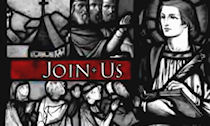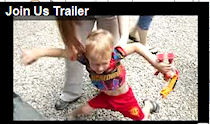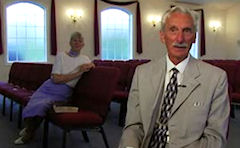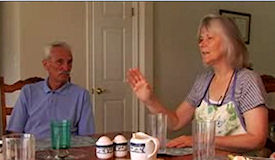Join Us - "Better Felt than Telt"
When my wife and I left the church in 1990, we spent a lot of time reading and discussing books that articulated the various characteristics of cults and abusive churches. These ideas proved a remarkable discovery, not only that there were other churches with similar practices and attitudes as ours but that the ability to spot an unhealthy church may be boiled down to a set of practices ranging from unaccountability with finances to strong authoritarian leadership to difficult exit process to a warfare mentality.
With former members, I have discussed items on this list ad nauseam until the pain, frustration and hurt began to seep away, and talking about my old church felt more like talking about the stupid stunts we used to do back in high school. Life is full of forgetfulness, and the one aspect of abusive church life that I forgot was the emotions. The problems of the abusive church may have come down to errant doctrine and wrong-headed practices and unorthodox ideas. But for us the thing that began the process of leaving was not any of these things.
Rather, it was the pain and the confusion and the sense of emptiness. It was the frustration of living in an alternative universe that seemed so real and important but yet couldn’t be reconciled with the constants in the vastly larger world outside. It was the nagging feeling that things weren’t adding up, coupled with the confusing message I was receiving that I had no business doing addition. It was the feeling that my New Testament world of light and life was becoming more and more unsustainable and I had no idea what to do.
It was the intrusion and lack of boundaries that were accepted as godly accountability. It was the doing things for God that didn’t seem to be consistent with who I thought God was. It was lying on my bed at night fantasizing about running away, yet believing I would be a lost person if I did. It was the distrust of my own thoughts and feelings and searching for something outside of myself to show me the way. I had forgotten this weird world.
 The movie Join Us certainly touches upon the list of characteristics of
abusive churches – they are all there. As a bonus feature, you
can see such a list spelled out if you care to read the very tiny print on
your television screen. But this is only secondary to what the movie is
about. The movie is about people.
The movie Join Us certainly touches upon the list of characteristics of
abusive churches – they are all there. As a bonus feature, you
can see such a list spelled out if you care to read the very tiny print on
your television screen. But this is only secondary to what the movie is
about. The movie is about people.
It is about what abusive principles did to people emotionally. It is about people who had no self-identity without Pastor. It is about people who had forgotten (or perhaps never had) tools to decide what is right and true. It is people who can’t understand why they allowed loved ones to be abused, and often did the abusing, and are grasping for explanations. It is about people who feel raped and pillaged but have no one to talk to because they lived in a world so twisted that the average person would have no mental categories to understand what they were saying.
Each person who sees this film will probably see different things. I found myself stirred and at times wanting to cry. The circumstances were different from my experience – this was a small Southern church with only a handful of families, who had direct a ccess to Pastor. I was in a larger church and had only a few brief and superficial conversations with the esteemed leader. And let’s just admit this here: I never (and to my knowledge no one else in my church ever) held a child’s hand on the fire to teach them about hell or beat their child so bloody that their pants dried to their skin.
Yet, I could identify their feelings of loyalty, their desire to be involved with the best that God has to offer ,and their willingness to follow Pastor, who was showing them the way no matter the cost or how counter-intuitive the path. I related to the fear that leaving might cause God’s approval to grow forever dim and that my choosing against the church would cause harsh, never-ending consequences thoughout eternity.
The film is roughly divided into three parts. In the first part, the former members show up at Wellspring Retreat for two weeks of counseling. They were gently taught to think for themselves, shown how they had given over their personhood to another, and were allowed to grieve over the abuse they had allowed or given to family members.
For some in the film, it was evident that the light bulb was going on as they began to see that their group produced something other than the fruit of Christianity. One even exclaimed to a counselor, “You just set me free”. With another, you can sense the denial, the fear of stepping out of the burning building onto the safety of “thinking for oneself”. With some you see even the mental block to call the leader anything other than the church-accepted title “Pastor”, which to them, had all the connotations of Apostle, Teacher, Leader, God.
One person commented how the abuse to their children would probably not
affect these children given they were so young.
 This was followed by shots
of a child acting out in uncontrollable rage. Mothers broke down as they
faced the fact that they stood by as their children were beaten and bloodied
by another, and even took part in this practice themselves. Husbands
grappled for words and meaning for what possessed them to abandon their
wives in time of serious need for the sake of Pastor.
This was followed by shots
of a child acting out in uncontrollable rage. Mothers broke down as they
faced the fact that they stood by as their children were beaten and bloodied
by another, and even took part in this practice themselves. Husbands
grappled for words and meaning for what possessed them to abandon their
wives in time of serious need for the sake of Pastor.
The film did not focus strongly on what brought these people to the church in the first place or what exactly was so attractive about the group that kept them coming until they were at the place where they couldn’t leave. However, one man’s story was telling. He said that when he was younger he was abused and his life was a total wreck. The first time he came to the church, he saw Pastor up in the front “in a beautiful green suit”. Pastor came up to him, welcomed him and gave him a big, warm hug. He was home.
These were not stupid people. These were people who had longings and needs that they somehow came to believe that the church and Pastor could meet. Decisions are not always made based on doctrine and principle and truth. Sometimes they are made based on undetected longings for significance and intimacy and meaning and the hope of finding a father’s smile and approval.
In the second part of the film, the filmmakers took us to the church. Here, we met Pastor. This was probably the most surreal part of the film because when I met Pastor and his wife, I didn’t see Adolf Hitler. I didn’t Jim Jones or Heath Leger’s Joker who cynically wants to see the world burn. Rather, I saw a charming elderly European couple who really seemed to be trying to minister and serve others. I felt myself pulled into the world of Pastor and his wife. Suddenly I was in this alter-universe of a humble servant whose ministry was falling down upon him because his people were being demonized.
When Pastor showed us his expensive cars his explanation seemed so plausible
and self-effacing about how he allowed himself this one little pleasure as a
small diversion from the difficult and demanding task of giving his life to
shepherd his flock.
 I wanted to say, “Of course, you may have your cars and
the houses that your congregation built for you. After all, aren’t you the
one who took these creatures from their pitiful situations and gave them a
step up into life?” But wait a minute! This world is not real! It is the world of Pastor. Not
the real world of abused children and stolen identities. Not the real world
of relentless guilt born out of belief in a frowning God and the loss of all
possessions with nothing in return.
I wanted to say, “Of course, you may have your cars and
the houses that your congregation built for you. After all, aren’t you the
one who took these creatures from their pitiful situations and gave them a
step up into life?” But wait a minute! This world is not real! It is the world of Pastor. Not
the real world of abused children and stolen identities. Not the real world
of relentless guilt born out of belief in a frowning God and the loss of all
possessions with nothing in return.
The complete incompatibility of the real world and the cult’s alter-world is seen through hidden cameras when the former members confront Pastor. They want an admission of abuse. Yet Pastor is unwilling or perhaps incapable of leaving his world. There was no abuse. There never was any abuse. There was only Pastor serving his flock, and his ungrateful people who had become demonized.
One incident shows the mental power and hold of this surreal world this cult
leader had created. Pastor’s wife talks with one member about how cruel it
is for the former members to bully Pastor when he was entering into first
stages of Alzheimer’s disease. While some former members couldn’t care less,
it did bring some sympathy in others. When this same member asked Pastor
about this later, he exclaimed how there were accusations going about saying
he was in the first stages of Alzheimer’s disease - but “they are all
liars”. When this member looked to Pastor’s wife for support, it was as if
the wife never said such a horrid thing. There was no Alzheimer’s statement.
It was all lies. It was all accusations. This is the world of Orwell’s 1984
where things are said and done but when it is not in keeping with the good
of Pastor, it simply never happened.
When this same member asked Pastor
about this later, he exclaimed how there were accusations going about saying
he was in the first stages of Alzheimer’s disease - but “they are all
liars”. When this member looked to Pastor’s wife for support, it was as if
the wife never said such a horrid thing. There was no Alzheimer’s statement.
It was all lies. It was all accusations. This is the world of Orwell’s 1984
where things are said and done but when it is not in keeping with the good
of Pastor, it simply never happened.
The rage of the former members was deepened when they discovered that there was no way to prosecute Pastor for the abuse and his taking of their money. This is the maddening reality of cults and abusive churches. The members have come to realize that they had been abused. Yet, there is no help from the former church because in that world, the abuse never happened. There is no help in the real world because the church’s world is so out-of-sync there is no mental category for legal systems to understand it.
At the end of the movie, former members moved away to start their own lives.
None of them found churches. Some tried but after their experience,
everything in churches seemed artificial.
 Some moved on to other forms of
spirituality. Others gave up. But the common thread was a general mistrust
and reluctance to accept the words of anyone who stood at the pulpit and
said in any way, “Join us”. The movie ends and we won’t know where these lives end up. They are left
with questions. Is there a God or not? Why would God let this happen? What
is real and what is fake? What is true community and intimacy, and what is
abusive? For the first time in their lives, they are willing and expected to
ask questions and think.
Some moved on to other forms of
spirituality. Others gave up. But the common thread was a general mistrust
and reluctance to accept the words of anyone who stood at the pulpit and
said in any way, “Join us”. The movie ends and we won’t know where these lives end up. They are left
with questions. Is there a God or not? Why would God let this happen? What
is real and what is fake? What is true community and intimacy, and what is
abusive? For the first time in their lives, they are willing and expected to
ask questions and think.
Thinking takes much effort, time and experience. Thinking makes mistakes and often has to start over and correct itself. Thinking is never perfect and is riddled with the real possibility of failure, bad ideas and wrong turns. It is never completely foolproof or safe. But hopefully they learned an important lesson that will be with them for the rest of their lives and passed on to their children – it is better than the alternative of turning their lives over to someone else to do their thinking for them.
